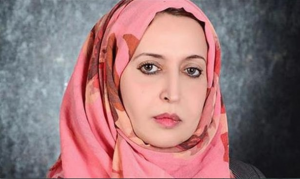It will be recalled that the Interim Government, which controls Benghazi and is one of two governments that claim legitimacy in Libya, denied that it or any forces linked to the LNA had any role in Sirgiwa’s abduction.
Indeed, its interior minister had blamed unidentified “terrorist groups who infiltrated Benghazi” for her abduction.
However, relatives and Benghazi residents with knowledge of the incident have been quoted as saying that they believed LNA-affiliated groups were behind the abduction and that some cars used in the abduction identified these groups.
HRW has rejected this as it holds the view that the authorities in eastern Libya excercise effective control on the east and therefore have responsibility and are accountable for crimes there.
“Blaming the kidnapping of an outspoken sitting member of parliament on unidentified terrorists is not helping find out where she is,” said Eric Goldstein, deputy Middle East and North Africa director at Human Rights Watch.
“The authorities need to do everything they can now to identify the kidnappers and locate Sirgiwa, and to ensure protection for her family.”
HRW has gathered evidence on the incident linking it with the LNA.
The kidnapping of Sergewa and violence against her family as well as the burning of her home follows a well-documented pattern of violence, reprisal, and intimidation by the LNA-affiliated armed groups in Benghazi amid total impunity for their actions, HRW said.
There have been dozens of cases of enforced disappearances and killings of journalists, activists, and politicians in eastern Libya since 2014, including the killing of Salwa Bughaighis, a prominent human rights lawyer and women’s rights activist, on June 25, 2014 by unidentified assailants, it added.
Enforced disappearance – the deprivation of liberty by agents of the state or affiliated groups, and concealment of the fate or whereabouts of the person in custody – is prohibited under international law. The authorities are required to investigate and take appropriate measures to protect relatives from any ill-treatment or intimidation during the search for a disappeared person, HRW said.
It added that since the start of the so-called Karama operation led by Haftar in Benghazi to “root out terrorism” in May 2014, scores of opponents or suspected opponents of the LNA have fled their homes in Benghazi and remain displaced in other parts of the country, prevented by the LNA and affiliated groups from returning.
HRW said that it has documented among those forcibly displaced cases of enforced disappearances of relatives, torture and other ill treatment, harassment and intimidation, destruction of property, and appropriation of real estate by forces loyal to or affiliated with the LNA in eastern Libya.
It added that all parties to a conflict are required to abide by the laws of war. Certain serious violations of those laws, when committed with criminal intent, are war crimes.
Anyone who commits, orders, assists, or has command responsibility for war crimes can be prosecuted by domestic or international courts. LNA commanders, including senior LNA leadership, may be criminally liable for war crimes of their subordinates if they knew or should have known of the crimes and failed to take measures to prevent them or hand over those responsible for prosecution, HRW said.
It noted that the International Criminal Court prosecutor, Fatou Bensouda, has a mandate to investigate crimes against humanity, war crimes, and genocide committed in Libya since February 15, 2011.
It said that HRW research in Libya since 2011 has found rampant violations by all parties to the conflict of international human rights and humanitarian law, including mass long-term arbitrary detention, torture and other ill-treatment, forced displacement, enforced disappearances, and unlawful killings.
“Senior Libyan government officials, both civilian and military, need to know that they can and should be held accountable by local or international courts if they fail to make serious efforts to end the violations,” Goldstein said.









